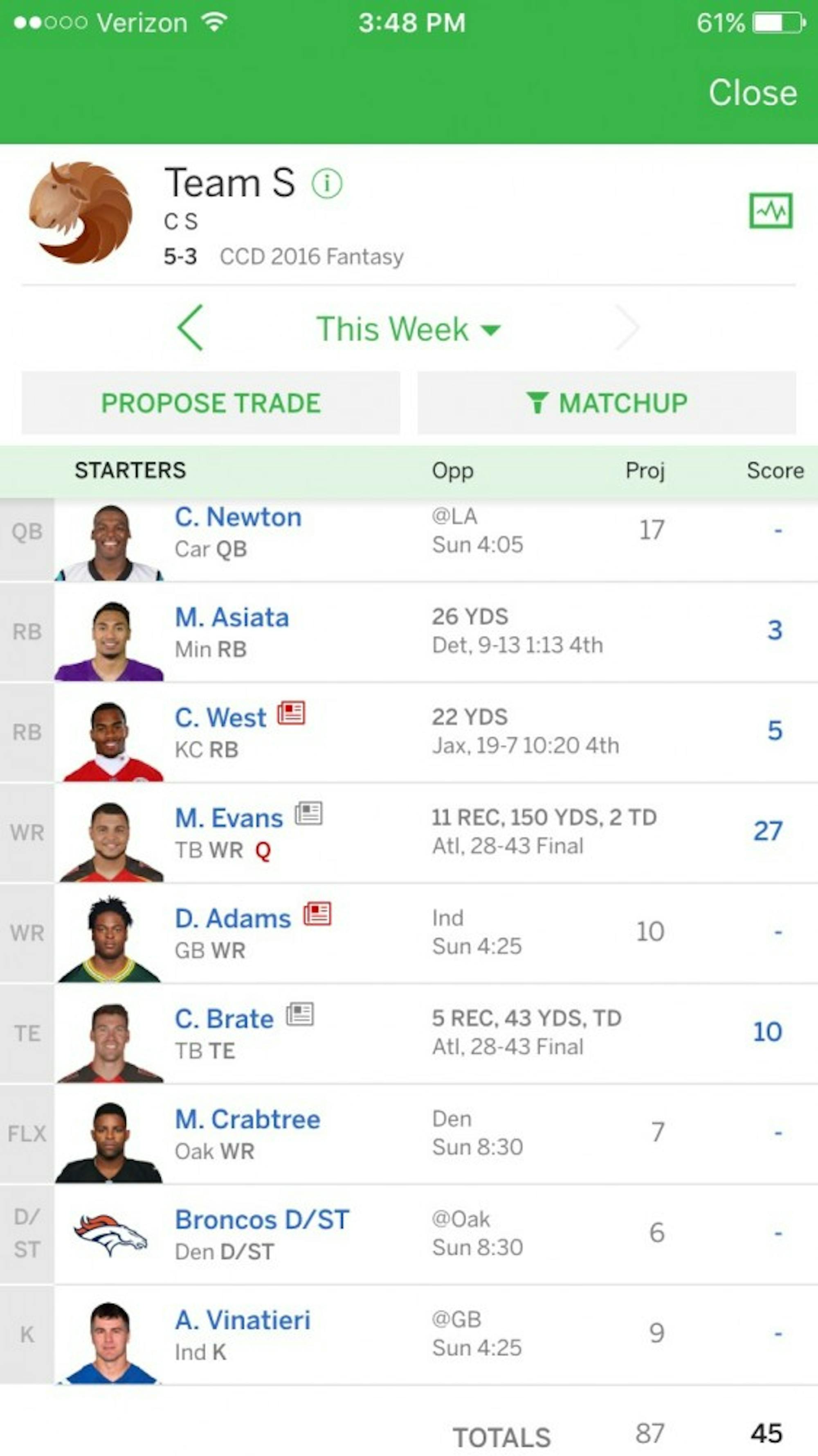On any given Sunday at Dartmouth, the television room in the Collis Center is swarming with two things: New England Patriots fans and fantasy football players. While the Patriots fans celebrate Tom Brady’s most recent superhuman accomplishment, the fantasy football players manically check their lineups for injuries, scrounge for players on the waiver wire and hope they play the right sleeper.
Often in two or three leagues each year, fantasy football transcends the NFL regular season and becomes the fantasy player’s sole obsession for the 16-week season. Here at Dartmouth, fantasy football, like most other sports, takes a back seat to academics. Nonetheless, it is exceedingly important for those who do find the time to play.
Though fantasy football can originally be traced back to Oakland Raiders businessman Wilfred Winkenbach, who devised the game with two Oakland Tribune writers in 1962, the game’s popularity really began to take off in 1997 when CBS launched the first free fantasy football platform on the market.
Less than 20 years later, according to the Fantasy Sports Trade Association, an estimated 57.4 million people play fantasy sports in the United States and Canada alone, a remarkable five-fold increase since 2005. The appeal of fantasy football specifically seems to be from its relatively short regular season, as compared to the 162 games that comprise a baseball season and the 82 games that make up a basketball season.
Furthermore, although legally not considered gambling, fantasy football certainly involves the movement of money, both publically and privately, thus satisfying those with gambling tendencies. Because fantasy sports lie in an online gambling grey area, the NFL was originally reluctant to back the new industry. Today, it is one of the NFL’s biggest marketing tools, yielding both an increase in live attendance and television viewership. Upstart companies such as DraftKings and FanDual, which began in 2012 and 2009, respectively, rose to prominence among fantasy football players as a way to keep track of games.
In 2009, fantasy football even entered the realm of pop culture with the popular FX show, “The League,” which follows a group of friends who struggle to balance their personal lives with their cherished fantasy football league.
Fantasy football at Dartmouth, aside from Sundays at Collis, is also prevalent in fraternities. Justin Ferrer ’18 plays in a 12 team point-per-reception league with brothers from his house, Sigma Phi Epsilon fraternity. With a $25 buy in, there’s money on the line for the top three players in the league.
In a standard fantasy football league, a starting lineup consists of one quarterback, two running backs, two wide receivers, one tight end, one flex, one defense and one kicker.
Ferrer’s league gives participants an additional wide receiver, which makes the league unique, he noted.
“It makes the teams pretty deep, which is kind of neat, and it requires way more skill,” Ferrer said.
With byes, injuries and an overall lack of productive players, finding a valuable 10th starter each week is an exceptional challenge. Ferrer, though having scored the third fewest points in the league this year, is currently tied for first heading into week nine of the season.
Some students may play with people from their high schools. For Charlie Sukin ’20, fantasy football keeps him connected with his hometown friends and engaged in the NFL season. Each week, Sukin and his friends stay updated through a group chat, where they talk about sports. Since this is a competition, Sukin said some of his friends do trash talk one another.
“People get really into [fantasy football],” he said.
Sukin, who is more of a soccer fan than a football fan, said fantasy football, “makes the game more interesting to watch. It’s much easier to watch two random teams play if you have players on their teams.”
Beyond the actual game, league tradition, as documented in “The League,” is one of the most important aspects of fantasy football. Sukin and his high school friends play fantasy Barclay’s Premier League in addition to ESPN fantasy football. In both leagues, the player who finishes in last place has to eat a ghost pepper, one of the spiciest naturally grown peppers in the world.
Therefore, draft day is the most important day of each season because fantasy players must scramble to find their one last sleeper pick. While teams can acquire players through waivers and free agency, most fantasy teams will come from the drafted players. Will Tackett ’18, who also plays fantasy football with his high school friends, said they add an additional layer of competition and importance to draft day, by playing a Super Smash Bros tournament to decide the draft order.
The toughest decision any fantasy football team player has to make each week is whether to root for his own favorite NFL team or for the players on his fantasy team. Sukin made it clear that he always roots for the Cincinnati Bengals, and that fantasy always takes a back seat. Tackett, a Philadelphia Eagles fan, takes a slightly different approach, saying, “If someone has Carson Wentz, the Eagles’ quarterback, and he’s playing against me, I wouldn’t root against the Eagles in that situation because he’s such an important player.”
As a personal rule, Tackett added, he tries to put the Eagles over fantasy, but in important fantasy matchups, he has to make an exception.
Will Tackett is a member of The Dartmouth staff.




